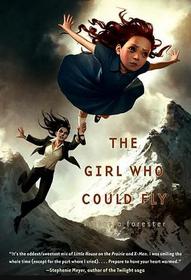Helpful Score: 4
I was initially introduced to The Girl Who Could Fly through Stephenie Meyer's Web site. Since the last book Ms. Meyer recommended was The Hunger Games by Suzanne Collins -- probably my favorite book of 2008 -- I quickly tracked down her new recommendation. Even the book's front cover carries Meyer's review, so the book's intended audience is pretty obvious.
In her review, Meyer calls The Girl Who Could Fly "the sweetest/oddest mix of Little House on the Prairie and X-Men." I can see where she's coming from. The author does some interesting things that are surprising, and the book really was nothing like I expected it to be.
The first interesting point is the lack of a defined point in time for the story -- or at least, the author's shrouding of the point in time. The title character, Piper McCloud, is a home-schooled farm girl raised by no-nonsense, but loving, parents. She's a chatterbox with big ideas and dreams that extend well beyond her hum-drum reality of chores and isolation. I assumed from the first five or so chapters that the book took place during pioneer days -- until Piper reveals her gift at a town event, and the helicopters and parade of black SUVs sweep in....
Piper is taken to a special institution for gifted kids like her. In time, it becomes clear that the seemingly well meaning instructors and staff don't want the children to learn to harness their talents -- they want to coerce them into being normal and like everyone else. They're also housing other extraordinary creatures, like a luminescent giraffe and a cricket that sings opera, that they're trying to "rehabilitate" through genetic modification and drugs. They try to convince Piper that her flying hurts the people she loves. When that fails, they use other means to keep her from flying...
This was a cute story. The author has a lot of fun with the names she chooses for her characters, and it's written at a very age appropriate tone and level for young adults. It's squeaky clean and has a great message about celebrating differences and the importance of never giving up. I don't think it transfers quite as well to an adult audience as some other "hot" YA books, but its a unique story that is definitely memorable. [close]
In her review, Meyer calls The Girl Who Could Fly "the sweetest/oddest mix of Little House on the Prairie and X-Men." I can see where she's coming from. The author does some interesting things that are surprising, and the book really was nothing like I expected it to be.
The first interesting point is the lack of a defined point in time for the story -- or at least, the author's shrouding of the point in time. The title character, Piper McCloud, is a home-schooled farm girl raised by no-nonsense, but loving, parents. She's a chatterbox with big ideas and dreams that extend well beyond her hum-drum reality of chores and isolation. I assumed from the first five or so chapters that the book took place during pioneer days -- until Piper reveals her gift at a town event, and the helicopters and parade of black SUVs sweep in....
Piper is taken to a special institution for gifted kids like her. In time, it becomes clear that the seemingly well meaning instructors and staff don't want the children to learn to harness their talents -- they want to coerce them into being normal and like everyone else. They're also housing other extraordinary creatures, like a luminescent giraffe and a cricket that sings opera, that they're trying to "rehabilitate" through genetic modification and drugs. They try to convince Piper that her flying hurts the people she loves. When that fails, they use other means to keep her from flying...
This was a cute story. The author has a lot of fun with the names she chooses for her characters, and it's written at a very age appropriate tone and level for young adults. It's squeaky clean and has a great message about celebrating differences and the importance of never giving up. I don't think it transfers quite as well to an adult audience as some other "hot" YA books, but its a unique story that is definitely memorable. [close]




